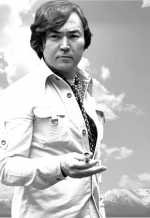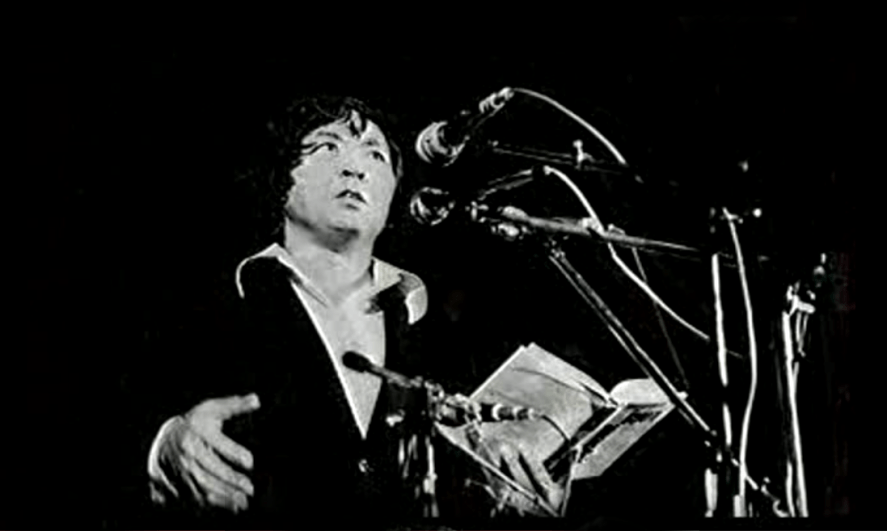 This interview with Olzhas Suleimenov was initially published in 2015 in the book Art-Atmosphere of Alma-Ata, co-authored by Zitta Sultanbayeva and Asya Nuriyeva. This is a shortened version of the text. It employed the articles and interviews of A. Arischevsky, T. Nusipbekov, K. Maitrekov, and Z. Sultanbayeva, as well as a transcript of O. Suleimenov’s speech at the KazNU conference dedicated to the 40th anniversary of the book “Az i Ya,” dated June 2, 2015.
This interview with Olzhas Suleimenov was initially published in 2015 in the book Art-Atmosphere of Alma-Ata, co-authored by Zitta Sultanbayeva and Asya Nuriyeva. This is a shortened version of the text. It employed the articles and interviews of A. Arischevsky, T. Nusipbekov, K. Maitrekov, and Z. Sultanbayeva, as well as a transcript of O. Suleimenov’s speech at the KazNU conference dedicated to the 40th anniversary of the book “Az i Ya,” dated June 2, 2015.
My book Az I Ya
My book Az i Ya is about Turkic influence on The Tale of Igor’s Campaign. Its essence is about the unity of the human world, multilingual and multiethnic human culture. I was accused of pan-Turkism and nationalism, but I wrote about the interpenetration of cultures even if they oppose each other in war. That is why I am a Eurasianist—a person who stands for the connection of the European and the Asian.
I have been told that this point of view has little in common with Lev Gumilev’s classical Eurasianism. He was actually the one who proclaimed the principal fragmentation of the world: we, Eurasianists, have no use for all those Western values. For us, there is collectivism, communalism, great “powerness.” For us, there is a way of Genghis Khan.
My father, Kazakh cavalry officer Omar Suleimenov, was imprisoned in the Zhezkazgan camp with Lev Gumilev. Their plank beds stood beside each other, and Gumilev used to say what a good lad Omar was. That is why even though he might have thought what I wrote about linguistics and history in Az i Ya was complete nonsense, Lev Gumilev did not write anything about it: he remembered the prison and Omar Suleimenov. And I, the son of Omar Suleimenov, a prisonmate of the son of Nikolai Gumilev, read a poem:
“I wish I was born in the mountains
Without being called a Kazakh,
Or lived in a white hut
Herding cows near ravines.
I would still be brought to Zhezkazgan
By train wagon.
I beg your forgiveness, Ukraine,
Oh, Ingush, forgive my land!
Kazakhstan, you are vast like five Frances
But no Louvres here or Monmartres.
Instead you contained all Bastilles
Of vile capitals.
Like a huge labor camp
You were floating on that little map.
We—the Kazakhs—were born in this camp.”
Going back to the book, I must thank those who helped me publish it.
Besides the publishing house, it was decided to send the manuscript to the Academy of Sciences. We were running out of time, and I convinced them that it was enough just to receive reviews from our scholars. My friend Aleksandr Zhovtis and associate professor Rashida Zuyeva wrote an internal review of Az i Ya, and with this review my never-to-be-forgotten friend G. Tolmachev went on to publish the book. Everyone was punished for this but for me. (They took me aside for a serious talking-to.)
I was shown a draft of the decree by the Bureau of the Kazakhstan Communist Party’s Central Committee, which stipulated punitive measures for those people who had allowed the release of the book. They were going to fire the chairman of the State Committee for Publishing, Sheriazdan Yeleukenov; the director of the Zhazushy publishing house, Abilmazhin Zhumabayev; and the deputy editor-in-chief of the Russian-language editorial office, Gennadyi Tolmachev; and question their membership in the Communist Party of the Soviet Union. The author of the book was meant to receive a serious lecture about not allowing such publications in the future.
The meeting of the Bureau was supposed to take place the next day. I spent all night writing a letter to Kunayev and members of the Bureau. Part of this letter was published in my 1990 compilation Selected Writings. The original must be somewhere in the Central Committee’s archives. I do not remember the whole text. I wrote that, as time went on, the document would not be seen as a personal matter, that I had always tried to avoid situations where other people suffered because of me. Out in the streets, I would give up my life for them. I would do the same now. The guarantee was my only personal property—my life.
Early in the morning, I took the letter to the Central Committee and left it in Kunayev’s waiting room, asking that copies be given to the members of the Bureau. We were all called in. Kunayev chided us. Brezhnev and Suslov dialed into the meeting. It was a serious discussion. The letter did its job. My friends received reprimands but retained their posts. The editor of the book, though not part of the Central Committee’s nomenklatura, also remained employed. He moved to Prostor magazine’s editorial office.
I am glad that the book has stood the test of time.
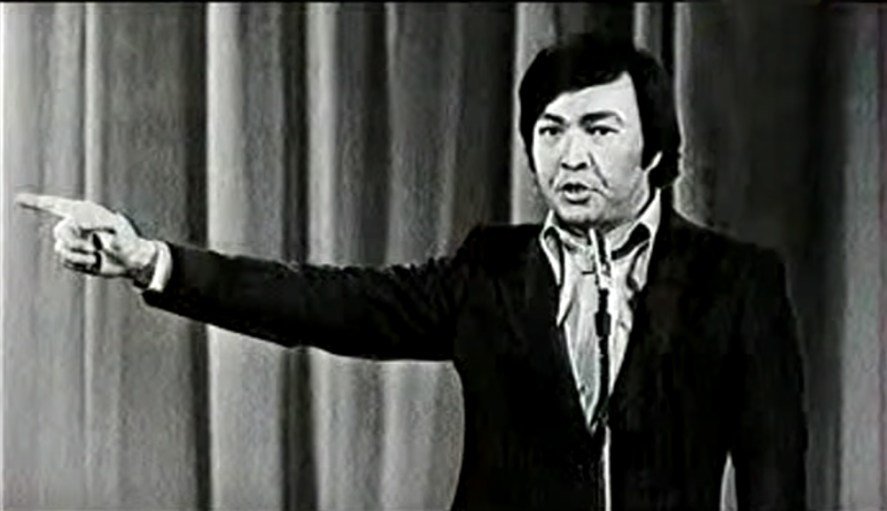
The Soviet Union is a part of our history
The Soviet Union was not close-minded, but it was an irritation to the world, which was split into halves. And suddenly this book became part of this global state—either conflict or interaction. This indeed turned out to be the fate of my book, as it bumped up against that close-mindedness in perceptions of history at the time.
History is a continuous line that connects the past with the present. However, during the Soviet era we had a dotted line, because the heralds of each period of the 20th century rejected that which came before. Lenin and Stalin rejected the Tsarist period despite the fact that they themselves created a powerful empire; Khrushchev completely rejected everything related to Stalin, including all the achievements of that period, and focused only on the ugly features of Stalinism. Brezhnev came in rejecting Khrushchev, alleging that nothing good was done in his era. Gorbachev came in rejecting the Brezhnev-era stagnation, though we all grew up in that very stagnation.
In my personal opinion, culture can blossom only in the time of such stagnation, not when breakthroughs, perestroikas, and revolutionary changes happen. Culture needs stability like wheat needs black soil. Something can grow in the sand, of course, but not golden wheat. Poetry is not created while on the run to some unknown destination.
The damn past?
I think young people have a negative outlook on the past largely because we did not properly explain to them the merits of the Soviet era. We have the attitude of revolutionaries. Everything that came before us is bad! The damn past! And we treated the Soviet period in the same way—that marvelous evolution of arts, literature, and cinema, the development of everything humanistic … I mean the 60s, the 70s and the beginning of the 80s, up until perestroika. After perestroika everything waned.
Books were released by the millions, and this was not enough. We were great readers back then. The whole country. Our books were released in 100,000 copies, 200,000 copies, and this was not enough. We had a black market for books. A book could be overpriced by up to 1,000 rubles. My book Az i Ya cost 75 kopeks per copy.
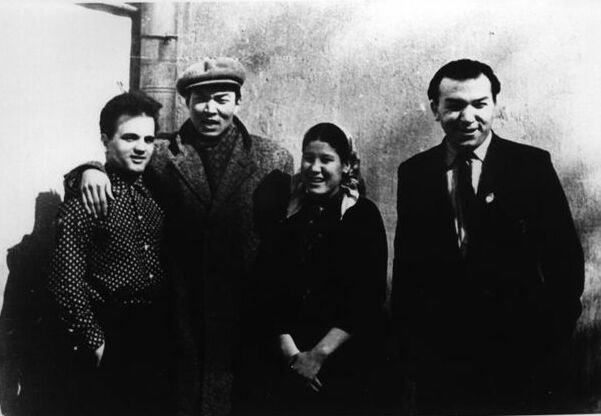
In the ’80s, I was the chairman of the republic’s Goskino, and I remember that we would sell 250 million cinema tickets per year. At the price of 30 kopeks per ticket, we made 70 million rubles. Meanwhile, to make movies Kazakhfilm only needed 25 million rubles. And those were great movies: Kyz Zhibek, Kokserek, Konets Atamana; they were shown throughout the USSR and abroad.
And what songs there were then! They are the best even today. One of them became the national anthem. Engineering and sciences both underwent development. My poetry books were released in 200,000 copies each. Even the thick literary magazine Zhuldyz had a monthly edition of 140,000 copies. Every family would have it, and there would be five people in a family. Now it has hardly a thousand copies per edition. Nowadays, youth do not read books, and this is bad! We would read from childhood on.
Thus, by rejecting the past indiscriminately, we lose something important for our present and our future. Because every new regime bulldozed the landscape of what came before, even the mountains, so they could start from scratch, our “true history” has started over and over again from new dates.
‘The Earth and its minerals belong to the people of Kazakhstan’
I am a geologist by training, and initially I was worried that our budgets for prospecting and exploration were 100 times smaller than in the Soviet era. Later, I came to be pleased by this. At the time, we used the deposits of oil and metals discovered by Soviet geologists. This, according to the forecasts, made up no more than 5-10 percent of our subsoil treasures. Our descendants will see the main part of the treasures. It is then, in those more stable times, when the state is developed and confident in its future, that the slogan, “The earth and its minerals belong to the people of Kazakhstan,” will live up to our hopes and become viable.
Socialism
The 1970s were the most stable, sated, and fruitful decade of the whole 20th century!
The entire 1980s were not stagnation, but non-stop motion upon an uneven soil: stumbles, dislocations, fractures. Searching for new ways instead of trying to repair the beaten track.
The republics went their own ways, and did each of them in the 1990s find a path that was better than the previous common path? Doubtful! We do not have this anymore, unfortunately. Therefore, when somebody starts criticizing the Soviet Union in my presence, I disagree. We were educated then, became patriots, loved our country, and loved Kazakhstan and the whole world. Nowadays I do not feel a similar ideology! Our youth misses out on this very important vitamin for the soul that our consciousness absorbed under socialism. I do not recognize capitalism. Deep down, I am and will remain a socialist.
Kazakh mentality
Kin-tribe thinking is traditionally strong in the aul (Kazakh village). Being immersed from childhood in the
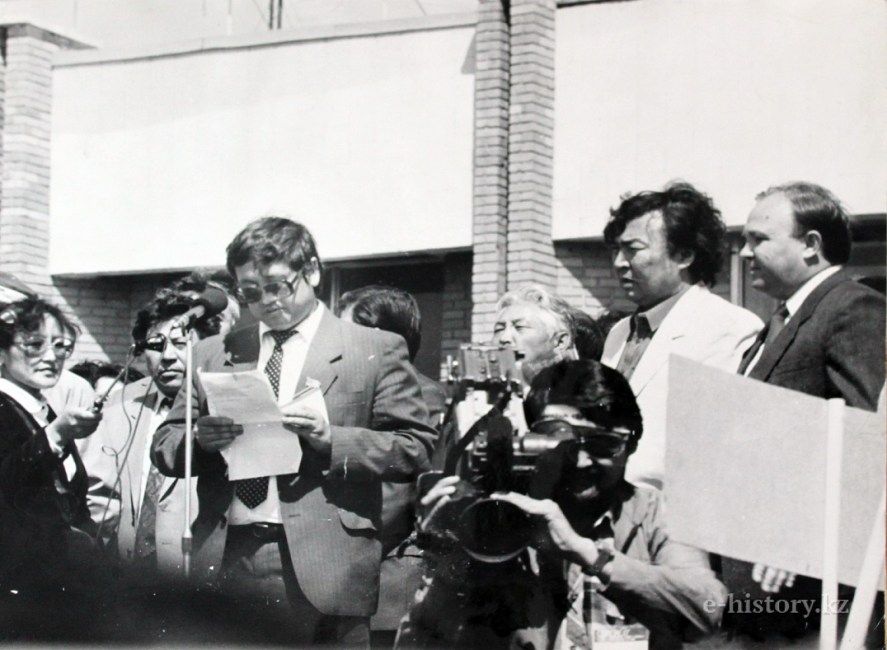
undiluted Kazakh community, you do not realize you are a Kazakh. This unifying ethnonym is not the main one in your mind. Before all comes the name of your clan, then that of your tribe. With this awareness, you come to a city, enter a university or a factory, and then you may learn that you are also a Kazakh.
Those in the city learn from a young age to see themselves as Kazakhs. Their grandparents might remind them a couple of times that they come from this clan and that tribe, but the message does not sink deep into their memory. However, they are constantly reminded of their Kazakhness by what surrounds them: streets, a school, a bus, a university, colleagues …
Thus, in Kazakhstan, the aul instills kin-tribe consciousness in people, while the city instills national and, with it, international consciousness. The most modern type of Kazakh identity has taken shape: a person born in an aul, who graduated from a Kazakh school there, and came to a city to study at a university or work in the industrial sphere. And the rest of their lives they spend in the city. What do they acquire in those decades? They become inherently bilingual, with national and international self-consciousness, diluted to some extent by waning kin-tribe thinking.
This is a typical portrait, and it matches many of our contemporaries, starting with the President. These are generations whose early years took place during Soviet times. Meanwhile, present-day youth are at a crossroads. Many still have to be taught using the examples of others how destructive their pretentious nationalism is, especially because it has its roots not in national self-awareness but in kin-tribe thinking.
Common pain of decolonized nations
For several decades, I have been studying the national liberation movements of Africa and Asia. I have been to dozens of countries and met their leaders.
In 1983, I brought a film crew to Rwanda. At the government’s request, we were making a film marking the 20th anniversary of liberation from “Belgian domination.” A beautiful country with kind, happy, free people. The president invited me to visit in ten years for the next celebration of the liberation. But in 1993 the presidential helicopter crashed. The president was from the Hutu tribe. Insulted people took out machetes, and in a week of mutual massacre more than a million people fell.
I often remember this example when talking about the common pain of decolonized nations: underdeveloped national self-awareness. There is not enough time for it to form, and often it gets replaced in politics with kin-tribe thinking, which does not unite people. This way of thinking turns notions like “freedom,” “independence,” and “democracy” into their opposites. And this is what we see in the recent history of decolonized nations.
Going back to our reality, I will say this: international experience and our own experience suggest that the main task of the intellectual class and the government is to raise the national self-awareness of people. Living in an international environment helps the cause.
The dream of a monoethnic state is not just mistaken but damaging—for Kazakhs above all. Kin-tribe thinking that breaks up an ethnic group does not quickly disappear. European peoples took several centuries to overcome this.
Divergence from the opposition
Ten years ago [2005 – editor’s note] we were celebrating Oraz Zhandosov’s birthday (former chairman of the National Bank of Kazakhstan and member of the political council of the “Democratic Choice of Kazakhstan”). It was a kind of bachelors’ party. In attendance were Altynbek Sarsenbayev (former member of the Government of Kazakhstan and a political opposition leader, murdered in 2006), Bulat Abilov (former politician, leader of the All National Democratic Party Azat) —well, the whole political opposition was there, as you can see. The very intellectual part of it. They asked me to take part in some important events because we were like-minded. But I told them:
“My friends, I will not participate in your work because I know more than you do. I’ve been to many countries of the former Soviet Union. I’ve been to Moldova when it was at war, to Tajikistan in the time of war in 1993 (I brought them baby food), to Azerbaijan when it was at war, to Chechnya and Ingushetia … I’ve seen what playing the game of democracy and liberalism, with which we are infatuated, can lead to. I am a liberal and a democrat as well. But preserving our country is more important to me at the moment. So I am pleading with you: consider my experience and the experience of our brother-republics and start saving our country! I want to protect you, too.”
But you remember what eventually happened. Sometime after this, Altynbek was killed. We could not unite the intellectual potential of the whole nation. We were supposed to stick together instead of separating and weakening one another. However, we did not cross the line and we will not, as long as we acknowledge this. Therefore, we must preserve these values and resist the well-known mistakes of young nations that become independent and think that independence is the end-point of a nation’s development.
I think this is a transitional period on the way to an era of conscious interdependence in which all states will feel interdependent. Currently the great Russia, Kyrgyzstan, Armenia, and Belarus have also entered this Union [the EAEU—editor’s note]. Sometimes I hear uneducated speeches of some “politicians” who speak out against the union. We have entered the union, in which we must realize our interconnectedness. Oh, the great Soviet Union! I regret that it collapsed. It was a country of great achievements, and each nation must preserve the best of what was there…
My new book
I recently bought three books in Moscow. [One of them was] A Myth in Three Seconds. Greek myths are told concisely—half a page. Because there are no readers! Right before our eyes, world culture grows scarce. Considering this, I will write more concisely as well—but not for a three-minute or three-second read. However, based on the etymologies that I will provide, you will understand how ancient are the Turkic language and its branches, like Oguz and Kipchak (to which the Kazakh language belongs). And these languages go back not 1,500 years, as academic science would have it, but maybe tens of thousands of years, to the Paleolithic Age, Neolithic Age, and so on. Or at least to the Sumerian writing system, which dates back to the 4th millennium BC. So their hieroglyphic writing is based on Turkic graphic symbols, developed and named by Turks. This was six millennia ago! Alongside them lie symbols to which Slavic people assigned sounds, and next to them Germans, Indo-Europeans, Protolatinics. This is the book I would like to release. It has a working title: The Turkic Pyramid.
We do not know ourselves. We do not know our past, the great things our ancestors created.
It is very important for an ethnic group to avoid having low self-esteem. It hampers our development. We do not know ourselves. We do not know our past, the great things our ancestors created. And for this reason, social sciences are more important for us than math, physics, and chemistry.
Almaty or Alma-Ata?
It [the city] has gained a lot, this is true. But the city is losing its clean air, greenery, and apples. Alma-Ata (and Almaty oblast) is the capital of apples, the origin of apples. In the 1930s, the academic Vavilov suggested that apples originated in the Almaty foothills and from there spread across the world. Kazakhstani biologists, followed recently by British scientists, proved Vavilov’s hypothesis correct.
Last year, the French shot a film about this and showed it in Paris in the main hall of UNESCO. We can be proud of the fact that Almaty is the birthplace of apples. The image of this fruit must become the emblem of the city. It is more entitled to this claim than New York, which Americans call “The Big Apple.” During the Soviet period, the city had the name “Alma-Ata,” which was right to the point: “the father of the apple,” “the grandfather of the apple”—that is, the forebear of apples.
In a bilingual society, both forms should be used. There are many examples of bilingual city names around the world. There are such examples even in our republic: Karagandy is the name in Kazakh, while in Russian the nominative form is Karaganda.
In Finland, which our economists like to refer to, there are also Swedes. They make up 6 percent of the population. Names of streets and cities are in both languages—Finnish and Swedish. According to them, not only the political but also the economic development of the country depends on this.
Bilingualism is fixed in our Constitution. It is difficult for Russian-speakers to pronounce “Karagandy.” Therefore, along with the Kazakh name, the Russian pronunciation is used. The same is true of the name of the southern capital city: for Russians (and they make up over half the city’s population), “Almaty” sounds like a word in the genitive case. Both variants are acceptable: “Almaty” in Kazakh texts and “Almata” or the usual “Alma-Ata” in Russian texts.
In Azerbaijan, they deal differently with the “y” in the ending of the name of the capital. In the state language, it is “Baky.” In Russian—“Baku.” Such bilingualism is not humiliating for the people; it is a sign of their culture.
The perfect model
In the CIS (Commonwealth of Independent States), there is only one monoethnic state: Armenia. Almost 100 percent of its population is ethnic Armenian. Can they be called a fully independent nation? Are they truly happy? No. They, like other nations, depend on their neighbors near and far! They live all their lives expecting a menace.
Let us imagine that, as some of our naive compatriots dream, only the few ethnic Kazakhs remain on the vast territory of our motherland, with its glut of wealth. What future can we expect? Will we be able to become a fully independent, happy state?
Our city and our country are models of multiethnic humanity. How we manage to get along with each other should serve as an example for the whole world. Kazakhstan has developed a model for the interaction of ethnicities, religions, and social classes, and this contributes to the evolution of the country—to our peace and unity. This can serve as a call for other countries to follow. In places where there is no interaction and one ethnicity stands out, civil wars happen. It is as simple as that. We can see it now in Ukraine and in other countries. We must consider this and not allow something similar to happen.
Olzhas Suleimenov
Olzhas Suleimenov is a poet, literary scholar, public figure, and diplomat. His contribution to the Kazakh culture is hard to overestimate
Alongside his legendary book Az i Ya and his staggering poetry, which made waves across the USSR, he was, as chair of Goskino (the State Cinema Committee), involved in creating “the new Kazakh wave.” He personally tasked Sergey Soloviev with preparing and rearing a new generation of Kazakh cinematographers. When loudly accused by some of his countrymen of betraying national interests by openly supporting the concept of Eurasianism, Suleimenov responded: “Russian academics used to fault me for nationalism. And now here, in my motherland, I’m faulted for internationalism by some of our pseudo-politicians. These things happen, even though I remain the same person I was then. Those academics were wrong, and so are our local non-academics for attaching that meaning to the very important word today—INTERNATIONALISM.”
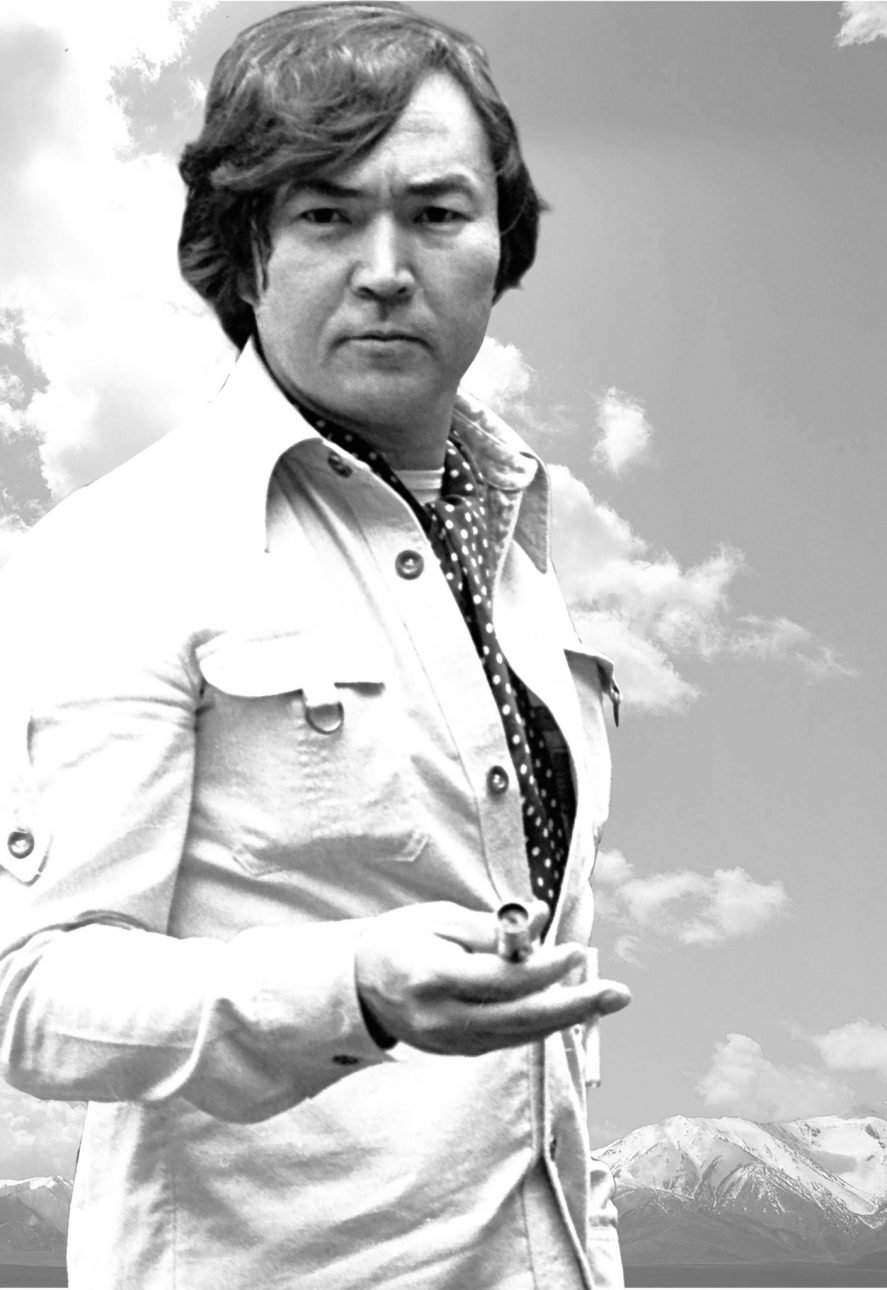
Born in 1936 to a direct descendant of Olzhabai-batyr, Omarkhan Suleimenuly, a Kazakh cavalry officer repressed in 1937, and Fatima Karagulova. “Remembering my youth, I must mention my second father—Abduali Karagulov. I owe him as well because he raised me, taught me, provided everything I needed to evolve. I will never forget all of this.”
Educated as a geologist, Suleimenov began his literary career in 1955. For nearly two decades in the 1970s and 1980s, he was a deputy chairman of the Soviet Union Committee on Relations with Asia and Africa.
In 1975, he released the book Az i Ya: Kniga Blagonamerennogo Chitatel’ia (Book of a Good-Intentioned Reader), which met with strikingly negative criticism in Moscow. The book was banned. For eight years, the author did not publish anything and hardly created any poetry.
He spent 18 years (between 1977 and 1995) as chairman of the Kazakhstan Chess Federation. He was a parliamentarian and member of the Presidium of the Kazakh SSR Supreme Council between 1980 and 1984, then a member of the USSR Supreme Council (1984-1989, 1989-1991). Between 1981 and 1984, he also served as chairman of the Kazakh SSR State Committee in Cinematography. From 1984 to 1992, he was secretary of the board of the USSR Writers’ Union, and from 1992 he was honorary chairman of the Writers’ Union of Kazakhstan and a creative worker.
In 1989, Suleimenov initiated and led the popular movement “Nevada—Semipalatinsk,” which sought to close the Semipalatinsk nuclear test site and other nuclear test sites around the world. Between 1991 and 1995, he served as leader of the People’s Congress Party, which developed out of his anti-nuclear movement; in 1994-1995, he was a member of the Supreme Council of the Republic of Kazakhstan (1994-1995). Between 1995 and 2001, he served as ambassador extraordinary and plenipotentiary of the Republic of Kazakhstan to Italy, Greece, and Malta.
His books include: Yazyk pis’ma (“on the origins of writing and the language of small humanity”) and Ulybka Boga, both published in 1998; Peresekaiuschiesia paralleli (an introduction to Turkic-Slavic studies), published in 2001; and Tiurki v Doistorii (about the origins of ancient Turkic languages and writing systems), released in 2002. For the latter book, Suleimenov was awarded the Kultegin Prize “for outstanding achievements in the field of Turkic studies.” Since 2001, Suleimenov has been a permanent representative of Kazakhstan to UNESCO (Paris). He is preparing the release of a large etymological dictionary, 1001 Words.
 Text and photos provided by Zitta Sultanbayeva, a poet, artist and journalist
Text and photos provided by Zitta Sultanbayeva, a poet, artist and journalist

